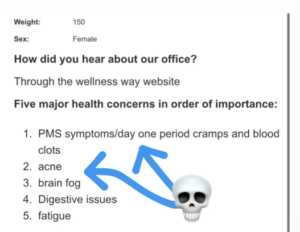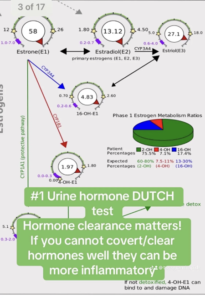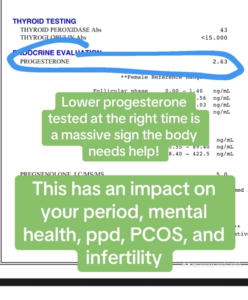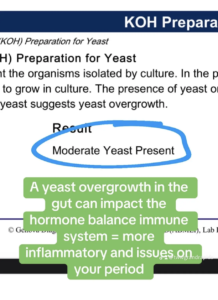 Does it seem like each month you have been suffering with horrendous periods and yet no doctor is willing to test and see what is going on? Or the few that do, typically say “everything looks good” meanwhile you’re still suffering. There is nothing more necessary right now than a change in the way female healthcare is dealt with. Here’s the missing link… WHAT you test and WHEN you test are two extremely important factors to address. Here’s an example of what patients are looking to change when they come into our office:
Does it seem like each month you have been suffering with horrendous periods and yet no doctor is willing to test and see what is going on? Or the few that do, typically say “everything looks good” meanwhile you’re still suffering. There is nothing more necessary right now than a change in the way female healthcare is dealt with. Here’s the missing link… WHAT you test and WHEN you test are two extremely important factors to address. Here’s an example of what patients are looking to change when they come into our office:
A major complaint that I receive when someone has gone to other docs is that, ‘they just don’t listen!’ In my opinion, we should be doing hormone specific testing at least 3 times per year for every single person and stop guessing or generalizing – that is a start to true healthcare.
Testing hormones can be done by blood, saliva, or urine and most docs when testing by blood only do a few markers at non optimal timing. Testing by saliva can be useful, but utilized by itself with no additional testing is often lacking information useful in care 👎. Testing thoroughly by blood and urine is personally my favorite when dealing with extreme bleeding and pain during a period. These symptoms can create such gaps in quality of life that many women stay home 1 week each month because of it! One week a month means 12 weeks out of the year which means 3 months of pain… WHAT?! Call me crazy, but I want more for you!
Timing when testing is EXTREMELY important! 19-21 days after your last period began there is supposed to be a shift in concentration of hormone type. Meaning instead of estrogens being a dominating hormone, progesterone should be taking the lead role. If progesterone production is too low then estrogen dominant symptoms like heavy flow and pain become abundant! Here’s an example of urine hormone testing.


Along with hormone testing, I think it is critical everyone get a stool test once per year. Sorry, I said it 🤷🏻♂️ Fun fact, gut health has a massive impact on hormonal health. There are crucial markers that allow me to see what your metabolism is like and your ability to clear harmful/inflammatory hormone metabolites detected in urine hormone testing.
The other side of massive hormone issues is a lack of the hormone progesterone. Often, ladies that have previously had this tested get it tested at the improper time of their cycle. I typically like to see this roughly 6 days after ovulation.

Low progesterone has massive impacts on your period, mental health, postpartum depression, PCOS and infertility. What causes lower progesterone? In short – stress – but there are different kinds. Mental stress plagues everyone but when it occurs in the second half of your cycle the effects can be detrimental. Physical stress like pain can impact this. Lastly, toxic stress often goes under the radar but must be addressed! This is where gut health can become extremely important. If you have a bacterial, or yeast overgrowth in your GI that is a type of toxic stress. This can not only lower progesterone, but either raise estrogen levels or keep estrogen from being converted well! This is why I say NEVER discount gut health when talking about hormone health. Painful periods, heavy flow, hormonal acne, and fatigue can all be linked back to gut health.
 So yes, there is hope for your hormones that doesn’t include a blanket bandaid of birth control pills. What we can do first is listen to the symptoms the body is giving us, test the state of the body, and test for what got us into this position in the first place. From there we can form an accurate action plan to move forward not have to resort to praying the birth control pills are enough to save us.
So yes, there is hope for your hormones that doesn’t include a blanket bandaid of birth control pills. What we can do first is listen to the symptoms the body is giving us, test the state of the body, and test for what got us into this position in the first place. From there we can form an accurate action plan to move forward not have to resort to praying the birth control pills are enough to save us.

